 God provides. Relying on Jesus means that we trust that God provides. Provides what? Not everything we want, the way we want it, and when we want it. No, God provides what we need, the way we need it, and when we need it, even if we cannot see it at the time. Living life for a length of time often teaches us to see and trust in this way. The alternative is simply reliance on self which can lead to bitterness and damage to ourselves and others. Relying on Jesus means that we trust that he, as God, is working 100%, offering us the grace to persevere, even during times of great challenge. He laid down his life for us on the Cross, so that we might experience the fullness of God providing for us, the opportunity for Eternal Life. We are called to trust in God who provides. While presented here as seemingly simple, it is not. We like to feel as if we are in control of our lives and destiny. It is hard to surrender ourselves to Christ and rely on him. Faith gives us the ability to do it. The charity of Christ offers us the grace of faith, since God always wills our good in ways that we often do not expect or imagine. God provides. Let us rely on Jesus Christ. May the charity of Christ urge us on! In God, the Infinite Love, Fr. Frank
0 Comments
 Cascia, the city of St. Rita, whose feast day is today, is a beautiful mountainous place in the region of Umbria in Italy. Its natural beauty obscures a violent past, which St. Rita experienced in her own life through the violent deaths of her husband and sons. Violence continues in our world in many different ways. One way is the violence that is done through lack of care of our common home, all of creation, including human beings. Pope Francis tells us in Laudato Si’: “Sin is manifest in all its destructive power in wars, the various forms of violence and abuse, the abandonment of the most vulnerable, and attacks on nature” (66). St. Rita forgave those who killed her husband and sons. She worked for reconciliation. Today, in Cascia and shrines in honor of her throughout the world, the work of reconciliation is a hallmark. We need to ask ourselves how we are reconciling the sins that Pope Francis identifies. The Pope reminds us that “everything is related, and we human beings are united as brothers and sisters on a wonderful pilgrimage, woven together by the love God has for each of his creatures and which also unites us in fond affection with brother sun, sister moon, brother river and mother earth” (Laudato Si’, 92). May the charity of Christ urge us on! In God, the Infinite Love, Fr. Frank
 We are in the time of the Upper Room, the Cenacle. The days between the Ascension of the Lord and Pentecost are liturgically the time when the Blessed Virgin Mary, the Apostles, and the disciples were together in prayer, awaiting the coming of the Holy Spirit. They did not really know what to expect. In fire and wind, the Holy Spirit came, and their lives were transformed forever. The world is also transformed and is transforming. The mission continues in the name of Jesus Christ! We are sent as apostles, as missionary disciples, out into the world. Hiding in a room, in our homes, even in a church is not our call. Instead, we go forth, going where the Holy Spirit moves us to go. We can do amazing things in the name of Jesus Christ. There is no need to wait until someone invites us. No, if we are baptized, and especially if we are confirmed, then we can go forth! We need to recognize, though, that we do not send ourselves. We are sent by Christ, in and through his Church. The community of faith that we call Church is where we go forth from and to which we return. The Church teaches us, forms us, heals and nourishes us through the Sacraments, and sends us on mission. The mission is not ours; it is Christ’s. We, as members of Christ’s Faithful, are called to live his mission until he comes again, just as the Apostles were told to do. In all of this, Mary, Queen of Apostles, is with us as our Mother and Queen. Her feast day is the day before Pentecost. She was the perfect disciple of Christ. St. Vincent Pallotti said of her: “We have most holy Mary, after Jesus Christ, the most perfect model of true apostolic zeal, and of perfect love” (OOCC I, 7). The Decree on the Apostolate of the Laity of the Second Vatican Council echoes this sentiment of Pallotti: “The perfect example of this type of spiritual and apostolic life is the most Blessed Virgin Mary, Queen of Apostles, who while leading the life common to all here on earth, one filled with family concerns and labors, was always intimately united with her Son and in an entirely unique way cooperated in the work of the Savior… All should devoutly venerate her and commend their life and apostolate to her maternal care” (4). Mary, Queen of Apostles, pray for us! May the charity of Christ urge us on! To learn more about Mary, Queen of Apostles, please click here. **This blog was originally published on May 19, 2021.**
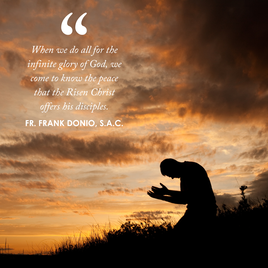 “For the infinite glory of God.” St. Vincent Pallotti pondered greatly about God as infinite love and that all that we as human beings should do all for the infinite glory of God. He would even put the initials AIDG at the top of his letters to others. Of course, his use of this term is an expansion of “for the greater glory of God” of St. Ignatius of Loyola whose spirituality influenced Pallotti. Due to being in Rome, Pallotti had access and involvement with many Catholic spiritual traditions and borrowed freely from them, often modifying aspects of them. Pallotti was clear that all that he did was for the infinite glory of God, not his own glory. He had numerous opportunities to have glory of his own, but he set them aside to focus on God and show the infinite love of God to others. It is well worth our asking the question of ourselves, whose glory do we seek? Is it our own, or that of another human being, or of God? When we do all for the infinite glory of God, we come to know the peace that the Risen Christ offers his disciples. When we go forth as his apostles, as St. Vincent Pallotti called all the faithful to be, we are called to do so for God alone. As we celebrate the 229th anniversary of the birth of St. Vincent Pallotti on April 21st, may the charity of Christ urge us on to do all that we do for the infinite glory of God. In God, the Infinite Love, Fr. Frank 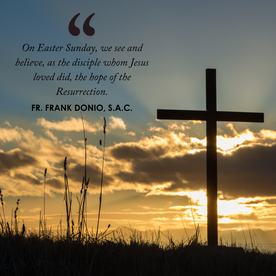 The time of the Paschal Triduum and the Easter season are almost upon us. How has the time of Lent been? It is meant to be one of ongoing conversion to Christ – metanoia. The Triduum offers us a deeper time of conversion. The Gospel readings of those days give us much to reflect on our own discipleship of Christ. On Holy Thursday, during the Mass of the Lord’s Supper, we experience table fellowship, the first Eucharist, and the witness of Christ in service to his Apostles through the washing of the feet. It is an example that we are called to follow. During the Commemoration of the Passion of Our Lord Jesus Christ, we hear of the betrayal of Judas, the denial by Peter, the suffering of Jesus, and the grief of those at the foot of the Cross, especially the Blessed Virgin Mary. In what occurs, we consider the ways in which we have not lived for Christ and how we can unite our suffering to his on the Cross. At the Easter Vigil, in the announcement of the angel to Mary Magdalene and the women at the tomb, we learn about the possibility of eternal life given to us all through the Risen Christ. On Easter Sunday, we see and believe, as the disciple whom Jesus loved did, the hope of the Resurrection. In this hope, we proclaim the Risen Christ as Savior of the world! Metanoia, ongoing conversion, is a patient journey that leads to our true joy, deeper encounter with the Risen Christ! May the charity of Christ urge us on! May you have a blessed Paschal Triduum and a joyous Easter! In God, the Infinite Love, Fr. Frank 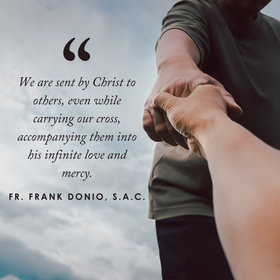 Taking up our cross and following Christ is not only for the Lenten season. It is the everyday life of a missionary disciple of Christ. We follow Christ and are sent by him into the world. The weight of our cross may be burdensome, but we are not alone. We are together with the community of faith, other followers of Christ who accompany us in prayerful solidarity. This is missionary discipleship. This is apostleship. We are sent by Christ to others, even while carrying our cross, accompanying them into his infinite love and mercy. Over the last weekend, members of the Catholic Apostolate Center team focused on missionary discipleship and accompaniment during presentations at the Archdiocese of Los Angeles Religious Education Congress. It is one of the largest Catholic gatherings in the United States with around 20,000 attendees of various ages and cultures, deeply committed to their Catholic faith and desiring to witness Christ in their lives. While there, we met collaborators and friends of the Center, and came to know new ones. It was a beautiful and uplifting experience. As you continue on your Lenten journey, may it be one of taking up your cross, following Christ, and going forth on mission for him! May the Charity of Christ urge us on! In God, the Infinite Love, Fr. Frank “Seek God and you will find God. Seek God in all things and you will find God in all things. Seek God always and you will find God always.” – St. Vincent Pallotti
God, the Infinite Love, is seeking us. We are not simply seeking God. God is seeking us. Our eyes, ears, minds, and hearts need to be attuned to see, hear, know, and feel the presence of God. St. Vincent Pallotti, whose feast day is today, understood well in his own life how to attune himself in this way. He knew that we do not do this on our own. The grace of God which we cooperate with gives us that ability. It is God seeking us! Look for God, listen for God, choose to open your mind and heart to God in all moments and in all places. St. Vincent Pallotti assisted all in seeking God and knew that they could not only seek, but find God. He believed that in our seeking and finding, Christ transforms our lives to live more fully for him. Christ sends us to others as his apostles, being the loving and compassionate face of God to those we encounter. Pallotti was this face, aligning his life with the poor, in whatever way that poverty was, physical or spiritual. He revived faith and rekindled charity and wanted other people of faith to do the same. Pallotti knew that he and we are not living our own mission, we are living the mission that Christ has given us. Ours is the mission to bring all to Christ in and through his Church. May the Charity of Christ urge us on! St. Vincent Pallotti, pray for us! In God, the Infinite Love, Fr. Frank "Commitment to ecumenism responds to the prayer of the Lord Jesus that 'they may all be one' (Jn 17:21). The credibility of the Christian message would be much greater if Christians could overcome their divisions and the Church could realize 'the fullness of catholicity proper to her in those of her children who, though joined to her by baptism, are yet separated from full communion with her.' We must never forget that we are pilgrims journeying alongside one another. This means that we must have sincere trust in our fellow pilgrims, putting aside all suspicion or mistrust, and turn our gaze to what we are all seeking: the radiant peace of God’s face” (Evangelii Gaudium, n. 244). Over the nine years that I was at St. Jude Shrine in Baltimore, Maryland, I had the opportunity to participate in and then to host an annual prayer service for Christian Unity. It became a very popular celebration and leaders from various Christian communities participated, including the Archbishop of Baltimore. To me, though, the most important people who participated were the people who went week to week to their faith communities in various parts of Baltimore, but never had the opportunity to pray together with Christians from other communities. Prayer is powerful and to underestimate its power to unite us leaves us lacking in the virtue of hope. Such hope is not naïve, but is based on firm trust in the work of the Holy Spirit. The annual Week of Prayer for Christian Unity will begin on Saturday, January 18th and conclude on the Feast of the Conversion of St. Paul on January 25th. Year after year, Christians are invited to pray that “they may be one.” St. Vincent Pallotti, patron of the Catholic Apostolate Center and founder of the Union of Catholic Apostolate, worked diligently for unity in the Church, using the liturgical Octave of the Epiphany in Rome as a means to unite in prayer members of the Eastern and Western traditions of the Catholic community who were rather disconnected from one another. This celebration was held in the city of Rome from 1836 until 1968. His feast day, on January 22nd, is in the middle of the Week of Prayer for Christian Unity. Collaboration of all Christians can lead us toward Pallotti’s vision, hope, and prayer that one day we may be “one fold, under one Shepherd, Jesus Christ” (Cf., Jn 10:16) Since our mission as the Catholic Apostolate Center is derived from the charism of St. Vincent Pallotti, who fervently prayed for such a day, we invite you to pray not only individually, but draw other Christians together in prayer. Prayer, though, is not the only thing that we can do. We can learn more about what the Roman Catholic Church teaches about the needed work for building unity among Christians. We invite you to explore the many resources that we have on our new Christian Unity page. May we also take up the call of the Catholic Church spanning from the time of the Second Vatican Council to the appeal of Pope Francis today: "The search for unity among Christians is an urgent task... We are well aware that unity is primarily a gift from God for which we must pray without ceasing, but we all have the task of preparing the conditions, cultivating the ground of our hearts, so that this great grace may be received" (Address to the Delegation of the Ecumenical Patriarchate of Constantinople, June 28, 2013). Please visit our Christian Unity resources by clicking here. **This blog was originally published on January 19, 2021.** 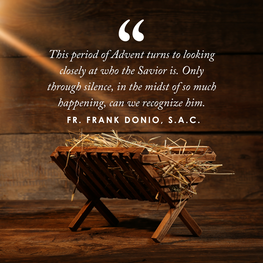 On the cusp of Christmas, our lives can be so full of doing this and that. It is usually not a time of silence and contemplation. And yet, the most famous Christmas hymn is Silent Night. It is worth considering that night that we will remember in only a few short days. This period of Advent turns to looking closely at who the Savior is. Only through silence, in the midst of so much happening, can we recognize him. Pope Francis offers us these considerations: “We can ask ourselves: What place does silence have in my days? Is it an empty, perhaps oppressive, silence? Or is it a space for listening, for prayer, for guarding my heart? Is my life sober or filled with superfluous things? Even if it means going against the tide, let us value silence, sobriety and listening. May Mary, Virgin of silence, help us to love the desert, to become credible voices who testify to her Son who is coming” (Angelus, December 10, 2023). The questions asked by Pope Francis are good ones to meditate on in these last days of Advent. Entering into listening and prayer, we can hear God’s voice more clearly. The voice of the One who comes into the world as Prince of Peace and sends us forth to testify to the world our faith in him. May the Charity of Christ urge us on! The Catholic Apostolate Center team is keeping you in special prayer during the Advent and Christmas seasons. May you have a blessed Christmas and a faith-filled New Year! In God, the Infinite Love, Fr. Frank 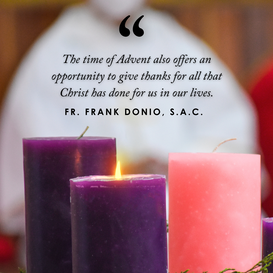 Many people do not like to wait. Western culture is instant. Waiting in line or waiting for something to arrive often creates impatience. The oft said line “patience is a virtue,” seems not to apply. We want whatever the thing is according to our schedule. God’s time, though, is not our time. We can be as impatient as we wish, but God will decide when the time is right. We need to decide if we are willing to wait, trust, and prepare. Christ is in our lives and wants to deepen his presence in us. Advent offers us a time to patiently wait for Christ who will come at the end of time and the one who is already incarnate among us which is what we celebrate at Christmas. The time of Advent also offers an opportunity to give thanks for all that Christ has done for us in our lives. It is a call to conversion of heart and deeper life in him. This is part of our preparation as we patiently wait. Conversion of heart may be a call to the Sacrament of Penance, so that we can receive the Eucharist in fuller love and openness. The Catholic Apostolate Center provides many resources for the Advent and Christmas seasons. We invite you to explore them and hope that they assist you in your preparation and waiting. For those in the United States, may you have a blessed Thanksgiving. For all, may you have a good and prayerful beginning to the Advent season. In God, the Infinite Love, Fr. Frank 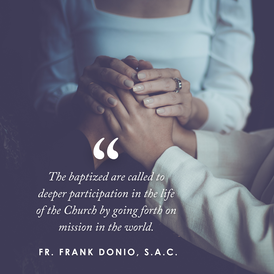 As the Church arrives at the first session of the Synod on Synodality, it is important to look at the three words associated with it – communion, participation, and mission. These are at the center of the dialogue and discernment that will occur. They are part of an ongoing reflection on the role of the baptized in the life of the Church, particularly from the Second Vatican Council onward. We are in communion with the Most Holy Trinity and each other in the Body of Christ, the Church. The baptized are called to deeper participation in the life of the Church by going forth on mission in the world. Each is co-responsible for the mission of Christ and the Church. As Pope Francis notes, “The Synod has three key words: communion, participation, and mission. Communion and mission are theological terms describing the mystery of the Church… Participation is a requirement of the faith received in baptism” (Address for the Opening of the Synod). The whole synodal process is a discernment in the Holy Spirit to examine how we as Church are on mission in the world. Have we closed ourselves off by becoming self-referential or are we moving outward as witnesses of Christ? Pope Francis is clear about what this discernment of the Synod is and is not. “I want to say again that the Synod is not a parliament or an opinion poll; the Synod is an ecclesial event and its protagonist is the Holy Spirit. If the Spirit is not present, there will be no Synod” (Address for the Opening of the Synod). We at Catholic Apostolate Center offer many resources to learn more about the upcoming first session of the Synod of Synodality, which will begin on October 4th and continue throughout the month, including a recent episode of our podcast, On Mission, with Dr. Susan Timoney, Associate Dean for Graduate Ministerial Studies in the School of Theology and Religious Studies at The Catholic University of America. Dr. Timoney gives an overview of the synodal process thus far and what is to come. It is worth taking the time to listen! Please keep all those involved in the Synod in your prayers. May the Charity of Christ urge us on! In God, the Infinite Love, Fr. Frank Both of my grandmothers had great devotion to the Blessed Mother. I remember going to their homes and seeing statues of Mary and other saints, prayer cards, and crystal and silver rosaries. I learned much from them and my mother about devotion to the Blessed Virgin Mary. Back in 1901, on this day, the feast of the Most Holy Name of Mary, my grandmother, Millie Donio, was born. During my childhood, though, I did not know that it was a feast day, because with the reform of the liturgical calendar in 1969, the feast was removed. Restored by Blessed John Paul II in 2002 in the revised Roman Missal, it is now an optional memorial. Interestingly, there is only one other feast related to the name of a person, the Most Holy Name of Jesus, celebrated on January 3rd. This feast day was restored in 1996. The name, Mary, could mean “sea of bitterness” or, possibly, “beloved”. Consider for a moment how many situations Mary found herself in that could have resulted in bitterness. When the unwed young Mary was told by the angel Gabriel that she was pregnant by the “power of holy Spirit,” she did not focus on her own situation, but made herself available to her cousin Elizabeth (Lk 1:39-40). When her son, Jesus, went off preaching suddenly at age 30, the scriptures show no evidence of her complaining about it. Instead, she says, “Do whatever he tells you” (John 2:5). No bitterness there. When she is at the foot of the cross watching her son die before her eyes, powerless to do anything about it, she accepts being given over the care of the Beloved Disciple, he as her son, she as his mother (John 19:26-27). Sorrow, yes. Bitterness, no. A “sea of bitterness” around her, but she, being the perfect disciple, shows us the way to be. She shows us how to live as beloved by God. My grandmothers showed me how to live as one beloved by God. They each had their various hardships in life – physical sufferings, emotional difficulties, financial challenges – but each held firm to her faith and it was faith in God that sustained them. They each moved outside of themselves and cared for others, even in the midst of their own struggles. I will never forget going with Grandmom Donio quietly dropping off bags of fruits and vegetables at the back doors of the homes of people she knew were in need of them, but were not able to ask others for help. No words exchanged, we were not even seen, just an action done for good because the other is beloved by God. Being beloved by God does not mean there will be no suffering or challenge in life. Being beloved by God, called by our name in Baptism, which claimed us for Jesus Christ, we are not left alone to simply move through life. We have the ones we call by name, Mary who intercedes for us with the other person we call by name, Jesus, who is also the Son of God. We call also on the names of the other baptized in the community of faith, the Church. We call out with all of our needs as we live in what can seem at times like a “sea of bitterness.” But, we are not meant to be bitter in life, no matter what we experience. Pope Francis offers us encouragement to move out of ourselves toward others: “Let us never yield to pessimism, to that bitterness that the devil offers us every day; let us not yield to pessimism or discouragement: let us be quite certain that the Holy Spirit bestows upon the Church, with his powerful breath, the courage to persevere and also to seek new methods of evangelization, so as to bring the Gospel to the uttermost ends of the earth (cf. Acts 1:8)” (Audience with the College of Cardinals, March 15, 2013). What are we to do then? Not live in bitterness, but witness as ones beloved. We are to call others by name and assist them in being good disciples of Jesus Christ, following the pattern of life and asking the intercession of the one called Mary. **This blog was originally posted on September 12, 2013.**
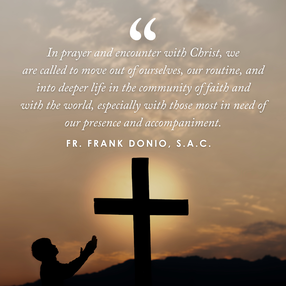 “When we become creatures of habit and grow bored, and the mission becomes a ‘job’, it is time to open our hearts to that second call of Jesus, for he never stops calling us. He calls us to make us set out; he calls us to remake us. Do not be afraid of this second call of Jesus.” - Pope Francis, Homily for Vespers with Bishops, Priests, Deacons, Consecrated Persons, Seminarians, and Pastoral Workers, World Youth Day, Lisbon, Portugal, August 2, 2023 Many people who read our newsletter engage in some type of ministry within the Church, full-time or part-time. Others engage in various types of apostolic work. All are serving the mission of Christ and the Church, each in the way in which they are called. Sometimes, as Pope Francis points out, “mission becomes a ‘job.’” We may need to recognize a “second call of Jesus.” He calls us to himself most profoundly in the Eucharist, whether at Mass or in adoration. In prayer and encounter with Christ, we are called to move out of ourselves, our routine, and into deeper life in the community of faith and with the world, especially with those most in need of our presence and accompaniment. Each of the reflections below given by seven bishops, including the President of the United States Conference of Catholic Bishops, Archbishop Timothy Broglio of the Archdiocese for the Military Services, is not simply for the time of World Youth Day. They are quite relevant to all on mission for Christ as we commit ourselves daily to living for him. We invite you to listen to them as part of your time of prayer or as you journey to others on mission. May the Charity of Christ urge us on! In Christ, Apostle of the Eternal Father, Fr. Frank 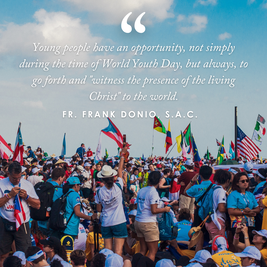 The theme for World Youth Day 2023 is “Mary arose and went with haste” (Lk 1:39). This celebration is not simply for those who go to Lisbon, Portugal, but also for all young people and those who work with them. It is an invitation, an opportunity, to enter into a spiritual and evangelizing experience. As the official website for World Youth Day 2023 remind us: “ “Leaving in haste represents the attitude depicted in Pope Francis’ indications for WYD Lisbon 2023: ‘may young people’s evangelization be active and missionary, for this is how they will recognize and witness the presence of the living Christ.’” “Leaving in haste” means that young people and all the baptized are called to go forth and witness Christ. Staying only where we are and with people with whom we are comfortable can result in our becoming complacent in our spiritual lives. We need to be missionary, including in our prayer. Is our prayer simply about ourselves or do we take the example of the Blessed Mother and be less concerned about ourselves and more concerned about others and doing the will of God? She left in haste to go to her cousin, Elizabeth, who in her advanced age was pregnant with St. John the Baptist. The main announcement of the Archangel Gabriel to the Blessed Virgin Mary was that she also was pregnant, but in a miraculous way by the Holy Spirit, carrying the Savior of the World, Jesus Christ. Instead of dwelling on her own situation, she went forth bearing Christ to Elizabeth whose child leap in the womb for joy! When we bear Christ to others – when we witness Christ – some may reject us, but others will receive us with joy. Their joy is not about us, it is about Christ. Young people have an opportunity, not simply during the time of World Youth Day, but always, to go forth and “witness the presence of the living Christ” to the world. May the Charity of Christ urge us on! In God, the Infinite Love, Fr. Frank 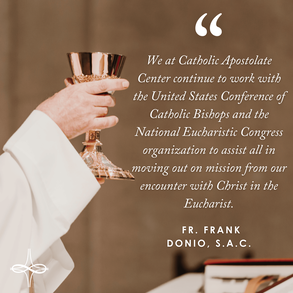 The National Eucharistic Revival in the United States moved into its second, or parish, year on the Solemnity of the Most Holy Body and Blood of Christ. In July 2024, the Church in the United States will hold a National Eucharistic Congress. We at Catholic Apostolate Center continue to work with the United States Conference of Catholic Bishops and the National Eucharistic Congress organization to assist all in moving out on mission from our encounter with Christ in the Eucharist. On Monday, June 19, Pope Francis met with the organizers of the Congress and offered these and other important insights. His words are quoted here at length and should be reflected on often. “It is my hope, then, that the Eucharistic Congress will inspire Catholics throughout the country to discover anew the sense of wonder and awe at the Lord’s great gift of himself and to spend time with him in the celebration of the Holy Mass and in personal prayer and adoration before the Blessed Sacrament…. I likewise trust that the Congress will be an occasion for the faithful to commit themselves with ever greater zeal to being missionary disciples of the Lord Jesus in the world… This is the sense of a missionary spirit. You go to the celebration of Mass, receive communion, adore the Lord and then what do you do after? You go out and evangelize. Jesus asks this of us. The Eucharist, then, impels us to a strong and committed love of neighbor. For we cannot truly understand or live the meaning of the Eucharist if our hearts are closed to our brothers and sisters, especially those who are poor, suffering, weary or who may have gone astray in life” (Pope Francis, Greeting to the Organizing Committee of the National Eucharistic Congress in the United States of America). May the Charity of Christ urge us on! In God, the Infinite Love, Fr. Frank |
Details
Archives
July 2024
Categories
All
|
About |
Media |
© COPYRIGHT 2024 | ALL RIGHTS RESERVED

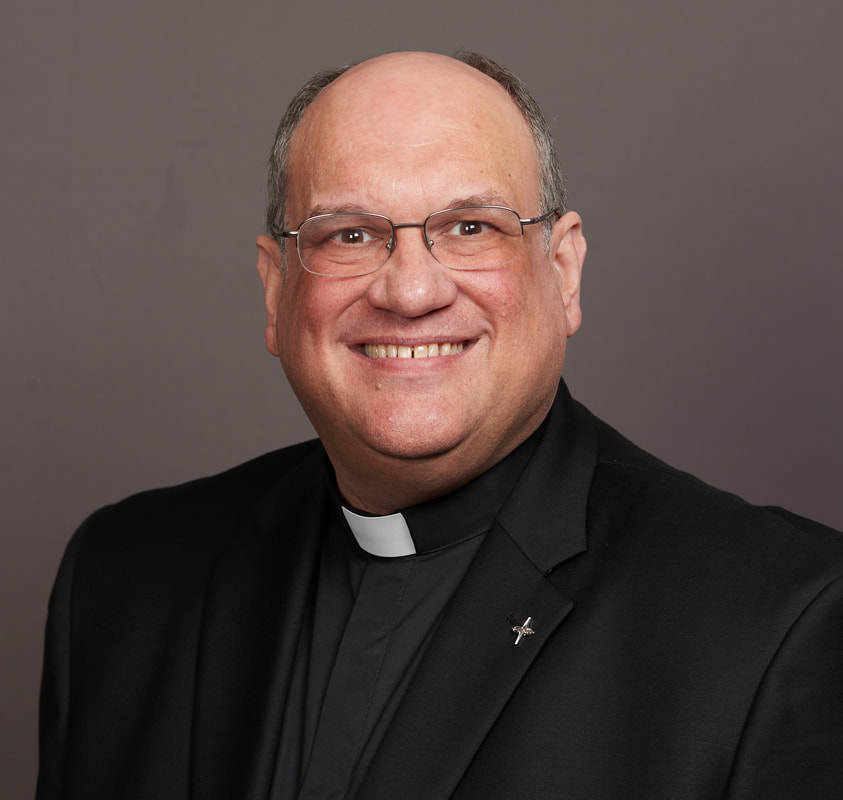
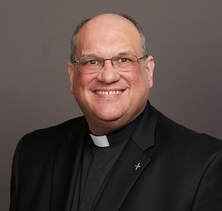
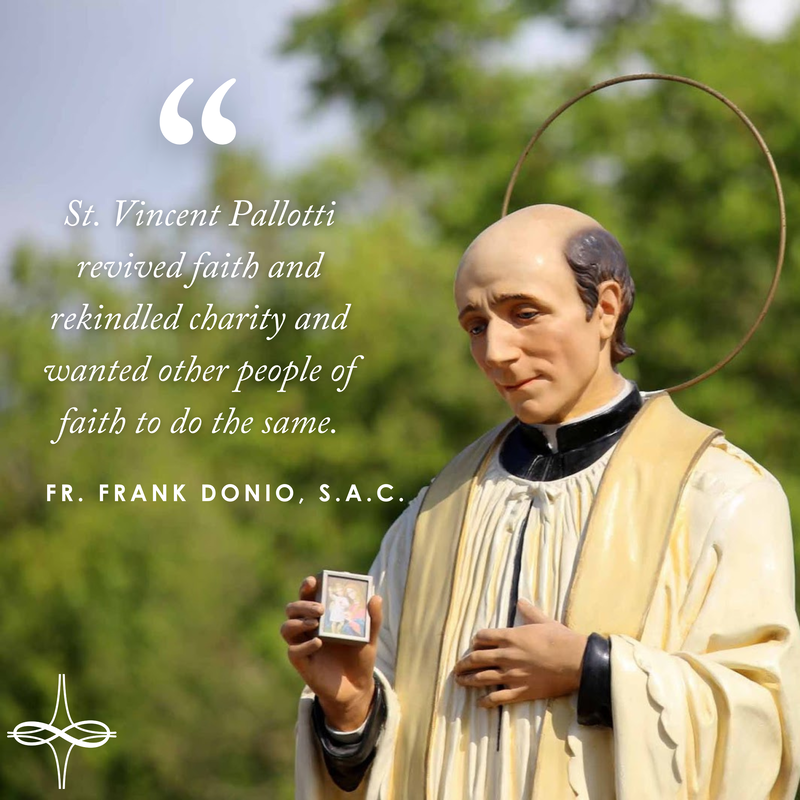
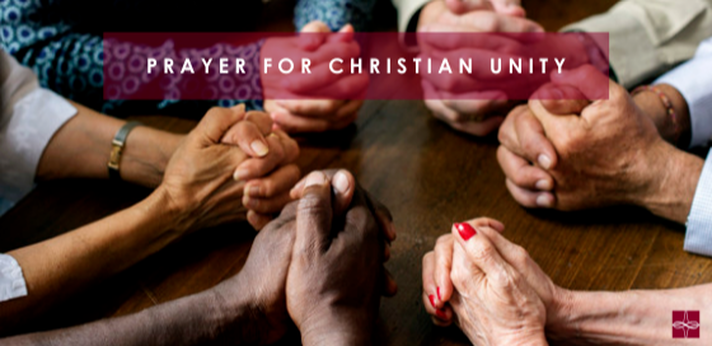
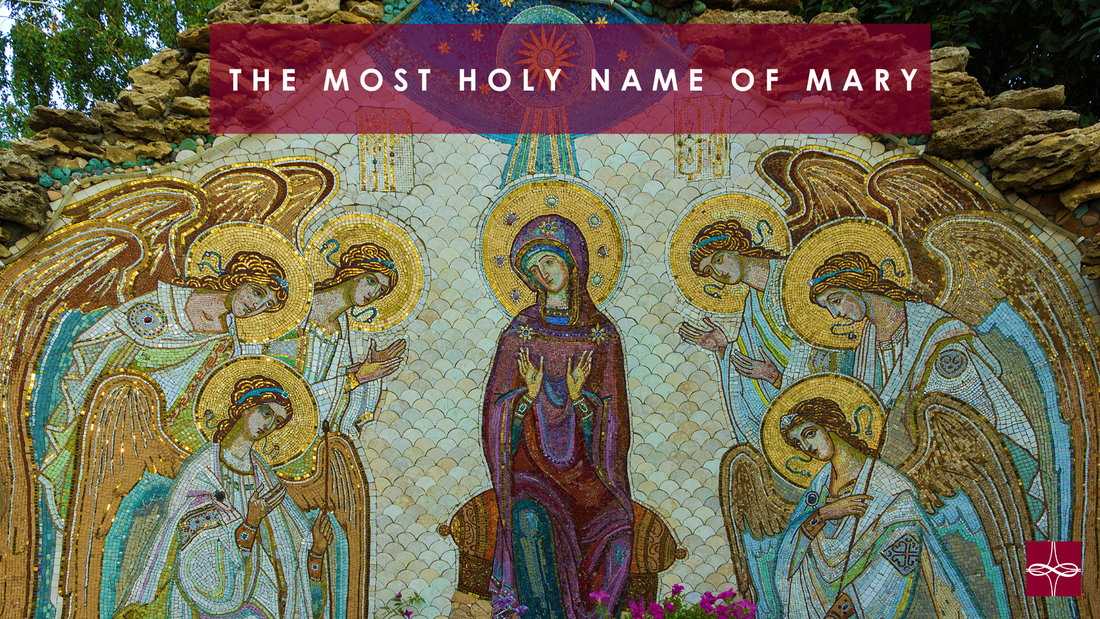
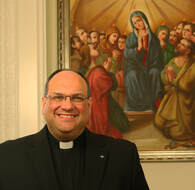
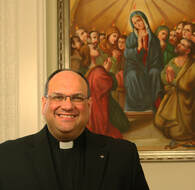
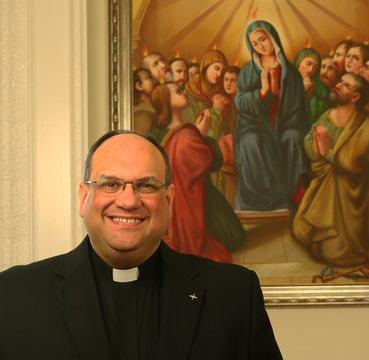
 RSS Feed
RSS Feed